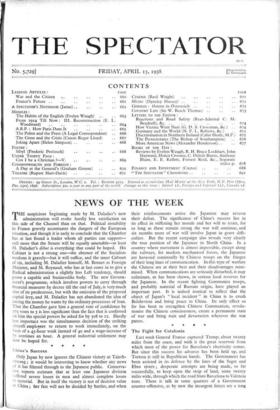NEWS OF THE WEEK T HE auspicious beginning made by M.
Daladier's new administration will evoke hardly less satisfaction on this side of the Channel than on that. Political instability in France gravely accentuates the dangers of the European situation, and though it is early to conclude that the Chamber has at last found a leader whom all parties can support— still more that the Senate will be equally amenable—at least M. Daladier's debut is everything that could be hoped. His Cabinet is not a strong one—the absence of the Socialists weakens it gravely—but it will suffice, and the inner Cabinet of six, including M. Daladier himself, M. Bonnet as Foreign Minister, and M. Reynaud, who has at last come in to give a Radical administration a slightly less Left tendency, should prove a capable and businesslike body. The new Govern- ment's programme, which involves powers to carry through financial measures by decree till the end of July, is very much that of its predecessor, but with the omission of the proposed capital levy, and M. Daladier has not abandoned the idea of raising the money he wants by the ordinary processses of loan. That the Chamber gave him a general vote of confidence by 573 votes to 5 is less significant than the fact that it conferred on him the special powers he asked for by 508 to t2. Hardly less important was the simultaneous decision of the striking aircraft employees to return to work immediately, on the basis of a 45-hour week instead of 40 and a wage-increase of 75 centimes an hour. A general industrial settlement may now be hoped for. * * * *






































